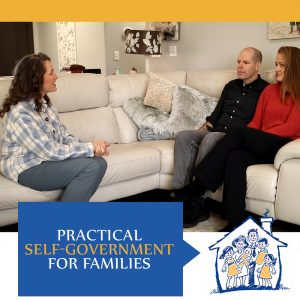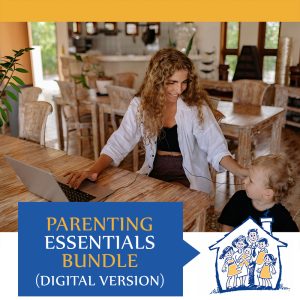Being Your Child’s Safe Place
It’s currently commonplace to see youth aggressively confronting adults when, not too long ago, that behavior would never have been condoned. And, sadly this aggressive behavior is being misinterpreted as behavior necessary for the emotional safety of the child. If parents want to be the ‘safe place’ for their child, then it’s vital that they don’t lose sight of their irreplaceable roles as teachers and guides to their child in the face of day-to-day childhood emotional entitlement.
I once witnessed a 14-year-old child yelling at her mother because her mother said she didn’t feel good about her going to a friend’s house. The yelling behavior instantly changed the focus for the mother. The mother was triggered by her child’s emotion to provide emotional safety for her child, so she allowed the yelling behavior. This led to the mother agreeing with the child and saying nothing about the disrespectful behavior. After the outburst the mother said, “You can go. Come give me a hug.” The two hugged and the child went to the friend’s house. Sadly, this story ends in the child getting into a car accident caused by her friend’s mother driving intoxicated.
Even though the intoxicated mother actually crashed the car, the mother of the 14-year-old, who allowed her to go, is also to blame; maybe even more so. That mother knew the child shouldn’t go to the friend’s house but allowed the emotions of her child to be more important than the guidance the child needed and the gut feeling she had. The mother interpreted her daughter’s emotional outburst as her daughter needing to feel safe. So, the mother assumed that her “no” answer had made her daughter feel unsafe.
Fast forward a few years and this mother/daughter relationship is not healthy. The mother is constantly trying to placate to her daughter’s ever-escalating emotions, and the daughter is unhappy and emotionally disconnected from her mother. Passively allowing her daughter to regularly yell at her has hurt their relationship and disconnected the healthy parent/child bond that should exist.
The Untruth About Feeling ‘Safe’
Many children and parents have been convinced that “feeling safe” means having everything go your way and according to your comfort level. But, in reality, that is the most unsafe position a person could ever be in. When will a person ever be able to control every other person or feeling of discomfort around them? Never, especially if everyone else is attempting to emotionally control every other person around them for their own safe feeling, too. The only way for children to feel truly safe is to be prepared for “no” answers, upsets, doing hard things, and honoring parents who aren’t afraid to guide their children, even if it requires correcting the child’s behavior.
When the words “child” and “safe” are put in the same sentence, parent ears automatically perk up. What parent isn’t concerned about their child’s safety? Looking out for the safety of our children is hardwired into us the moment we see them so tiny and helpless as infants. They literally rely upon us for everything, and we know that they won’t be able to have full autonomy until they’ve gone through proper development. Yet, today, the healthy development of children is under attack by untruths that use words like “child” and “safe.” Confused parents who hope for the safety of their children are being misguided and are creating entitlement problems for their children by facilitating yelling matches with their children.
Saying Nothing Is The Wrong Message
A mother named Christa recently wrote to me with the following question, “I am curious what your thoughts are on the popular notion, ‘Well your child acts out with you because you are their safe place.’ And then person A goes on to encourage person B to just keep doing what they’re doing as a parent. This is not an experience I’ve personally had, but I hear this between other moms a lot and it just doesn’t entirely set right with me.”
There is a reason this statement doesn’t sit right with Christa. It’s an untruth. To suggest that a parent should turn over their parental role to a feeling that a child is having is wrong. To teach a child that they must give into their emotions is to lead them toward emotional bondage for life. Parents who say nothing or do nothing about disrespectful, emotionally entitled behavior in their children are actually giving the message to their children that their aggressive behavior is healthy and effective for solving problems and that family roles are irrelevant.
Why do parents not allow their children to watch certain movies, play certain games, or be on certain apps or websites? Because they can’t condone some behaviors or ideas promoted by those sources. Parents seem to intrinsically know that if they allow their child to see something and don’t say anything about it or stop it, then they are showing approval of what the child has just seen or heard. Saying nothing shows approval.
Principles are broadly applicable. If a parent’s silence during an inappropriate movie shows acceptance of the behavior in the movie, then it is also true that if a parent is silent when a child is rude, mean, misbehaves, or states untruths that the parent is showing approval of that type of behavior or thinking.
If parents don’t teach their children to get calm and respect them, then the child learns two kinds of entitlement, emotional entitlement and relationship entitlement. It also teaches children to be controlling of others instead of teaching them to have self-control.
Parents Can Become Real Safe Places
It is true that a person who is attempting to micro-manage their environment or who is emotionally unloading on another person likely has anxiety at the moment. Anxious or worried feelings can make a person feel vulnerable. This vulnerability can be interpreted as a feeling of not being safe. It is also true that some people don’t express themselves or attempt to solve their problems if they don’t feel comfortable talking to someone about the problem they are attempting to solve. These two observances could be leading parents to believe that if a child yells at them or mistreats them, that the child is doing something healthy and displaying a feeling of safety.
However, another truth about this aggressive behavior directed at parents is that children who create a habit of emotionally dumping on their parents develop unhealthy social boundaries and bonds, unhealthy entitlement issues, lack of respect for parents, and inability to successfully, calmly solve their problems. While yelling at a parent is one way to get a point across, it is not the most effective way to get a point across. Parents who raise the communication bar for their children by teaching them the calm communication skills they need to really be understood and maintain bonds at the same time, ultimately give their children much more understanding and safety for the long run.
The following four actions are useful at becoming your child’s real safe place: have regular open talks with you child, teach your child how to recognize and choose calmness, teach your child the communication skills that they will need to solve problems, and consistently and lovingly help your child course correct when they are going off course.
Teach the child how to talk to you by having regular talks. Children should feel that communication with parents is always welcome. If the child has established a habit of talking and planning with their parents through regular family meetings and talk times, then the child will see having a healthy conversation as a viable option for solving a problem or getting understood.
Teach the child about calmness. Calmness is taught through example and training. Children can learn what calmness is and isn’t and how to recognize calm feelings and behavior in themselves. To teach this principle, parents can deliberately teach calmness to their children, discuss behavior that they see around them, and help their children develop a calm plan for when they are needing to increase calmness.
Communication skills are learned environmentally. Communication methods shown to children, whether healthy or unhealthy, will be seen as the communication standard for the child throughout life. Wise parents create environments where children learn how to accept the “no” answers of life and how to disagree appropriately with others, as well as other vital self-government skills that can help the child be understood throughout life.
As guides and teachers for children, parents express love by pointing out when a child is not on a healthy course and what they need to do to course correct. Parents, more than any other influence in a child’s life, are the ones who have the authority and the obligation to correct their children. When parents consistently and lovingly correct their children, then the children learn that correction is part of life and is healthy to embrace. When children accept correction from parents, this frees them to self-correct. If they don’t get the opportunity to accept correction from parents, then they lose identity and power. Parents who live their identity instill proper identity to their children. And, children who know that they can correct themselves are more motivated to make positive changes in their lives instead of making excuses, not accepting responsibility for their actions, or getting emotionally blocked as people who don’t accept correction do.
Being the safe place for your child is vital for the child’s future security, maturity, and problem-solving success. It requires the parent to take an active, not passive, role in instructing their child and opening communication instead of taking an emotional beating from their child. Christa is right. Allowing a child to yell at their parent just doesn’t feel right. And, coupling yelling, which is obviously not an emotionally safe action, with the word ‘safe’ seems ironic. Calmness and good communication are clearly safer communication alternatives.
Start calm parenting for free with Nicholeen’s free Calm Parenting Toolkit.
Index
- Accepting No Answers and Criticism, Age, Analyzing, Anxiety, Assertive Communication, Behaviors, Boundaries, Calm, Changing Hearts, Character Building, Common Vision Creation, Control, Correcting, Disagreeing Appropriately, Dropping the subject, Encouragement, Entitlement, Family Culture, Following Instructions, Four Basic Skills, Manipulation, Mutual Respect, Negative attention-seeking, No Answers, Out of Instructional Control, Power of Calm, Power Struggling, Praise, Pre-Teach, Problem Solving, Relationships, Respect, Roles, Skills, Social Skills, Structure, Teens (Youth), Toddlers & Younger Children, Tone, Tweens, Whining, Work Ethic, Yelling






